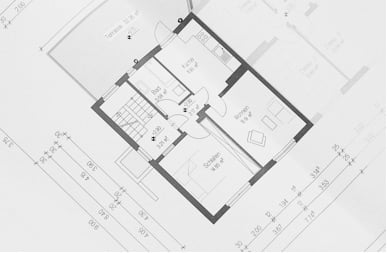August 3, 2021
Reviewed by Bob Tschudi, Home Building and Remodeling Expert.Written by HomeAdvisor.
If you’re in the planning or even just the dreaming phase of your next big home project, a few details probably come to mind: Your budget, your timeline and the contracting team who can make it happen. But finding the right person for the job is no small feat. Because it requires so much research and pre-planning, it can be overwhelming, intimidating or just plain frustrating for anyone to face the task of hiring a contractor. This guide takes the guesswork out of this undertaking for you by providing step-by-step information for finding a contractor that will make your home renovation dreams come true!

Image via Pixabay
Step 1: Finding Good Contractors
The first question you need to ask yourself is what type of project needs to be done. If it is a small, specific project, such as cabinetry, your best bet would be with a contractor who specializes in what you need done. If it is a medium-sized project and doesn’t include any structural changes to your home, you probably just need a general contractor. If it is a substantially large project, you will need either an architect (and, in some cases, a licensed structural engineer) who can approve structural changes or a designer who specializes in doing what a contractor and an architect do.
When you’ve determined the type of contractor you need, it’s time to sit down and do some research. Ask friends and colleagues to see if anyone you know and trust has any personal recommendations for contractors that they’ve used. You can also ask any local real estate agents or local suppliers, as they often rub shoulders with contractors in their field. Searching for local contractors on the Internet is an easy way to start if you cannot get any personal recommendations. Be sure to check if the contractors you are interested in have professional, up-to-date websites and if they have any ratings or reviews of them on the web. It’s a good idea to search their names with key words such as “scam” or “rip-off” before determining that a contractor is the right one for you.
Step 2: Calling Around
There’s no definitive number of contractors that you should call, but there are plenty of horror stories of bad contractors. That’s why it’s important to settle on a hefty list of 10-12 contractors to call based on your initial research. Your goal is to find 4-6 contractors during those phone calls that you feel good about and would like to meet with in person.
During the conversation, focus both on the manner in which they speak to you and their specific answers to your questions. During your entire conversation, you’ll want to be aware of a few details:
- Do they answer the phone professionally?
- Do they speak to you with respect?
- Do they listen to what you want to accomplish or do they tell you what they think you should do?
- Do they seem interested in and excited by your project?
- Do they answer your questions directly or do they give you the run-around?
Have your list of questions in front of you along with a pen and paper to jot down their responses and your impressions of your discussion. It’s important to write down what they say because your final decision can majorly impact your financial future, and it is difficult for anyone to keep track of 10-12 candidates! There are a few important questions you should make sure to ask:
- Are they licensed? Some states require licensing and some don’t. You can check out your state’s requirements and more information on licensing here.
- Do they have insurance and if so, what kinds of coverage do they have?
- Have they completed similar jobs to yours before? Be sure to have an outline and some important details of your project handy so that you are enabling them to answer this question as accurately as possible.
- Do they have a list of references you can contact? A good contractor should have plenty of satisfied customers as well as satisfied suppliers and subcontractors that you can call. And you need to call them.
- When will they be able to start the job? A good contractor is also very busy and you want to be sure they can fit you into their schedule when you need the project to be completed.
- Will they provide you with a detailed contract once you have both agreed to the terms of the project?
When you’ve finished calling all of the contractors on your list, select 4-6 that spoke with you professionally and respectfully, provided satisfying answers to all of your questions, and if possible, seemed excited to work with you. Finalize this list and call each of the contractors on it to request an in-person meeting to speak about the project further.

Image via Pixabay
Step 3: Meeting with Your Selected Contractors
During the meeting, you will want to gauge their interaction with you as well as their specific answers to your questions. Scam artists or contractors who are bad at their job can seem very friendly and personable before the real work gets started. Remember that you do NOT have to sign anything until you are satisfied with all of their answers to your questions, and that you may walk out at any time.
Here are some important questions to ask during the meeting. Have a pen and paper ready to write down their answers, just as you did during the phone call.
- How long has their company been in business?
- What is their permanent business address? Don’t be alarmed if this is a residential address; a good number of contractors do work from home.
- Are they licensed to work in your area? How long have they been licensed?
- Are they insured? What kinds of insurance do they have? Can they provide proof of insurance?
- Will your project require permits?
- How many projects like yours have they completed in the past year? This demonstrates their familiarity with your particular needs.
- Can they provide you with a quote and any reasoning for price? Be sure that all of the contractors you meet with in person give you similar quotes for pricing. If one gives you a quote that is much lower, this is most likely a scam or a guarantee of bad quality work.
- What do their payment schedules typically look like and are they willing to be flexible?
- Are they willing to show you a project they are currently working on? If so, check out their levels of organization and cleanliness and if possible, ask that homeowner if they are satisfied so far with the contractor’s work.
When you’ve finished meeting with all of your selected contractors, review your notes and decide which contractors you would like to work with, and schedule a second meeting with them. This is your opportunity to ask any questions you did not think of the first time, to ask more specific questions related to your project and discuss your project at greater length with them, to request paper copies of licensing and insurance for your records, and to ask if they can provide you with a sample copy of a contract.
Finally, before you make your final decision, contact the Better Business Bureau to check for consumer complaints. Keep in mind that sometimes even good contractors can receive complaints, so if your top choice has one, call them and ask how they resolved their customer’s issue. Was the complaint resolved quickly and professionally? Did the contractor finish the project with a satisfied customer?
Step 4: Negotiating Payment
Once you have decided on a contractor, your next step is negotiating price and payment. There won’t necessarily be much wiggle room on the price, but you will have to negotiate a payment plan and budget for contingencies.
There are no industry standards for specific amounts on payment plans; every contractor will be different. There are however two basic options for payment, each with their own attractions and drawbacks:
- Cost plus flat fee: The contractor will charge an agreed upon management and coordination fee (usually 13%-20%) plus actual cost of the project. The contract will lay out the estimated costs at each stage. This should closely match the total actual cost unless there are unforeseen circumstances, and it should be stated in your contract that your contractor will provide you with all receipts and accounting at regular intervals. This option allows for tons of flexibility, but it is much more difficult to estimate the final cost.
- Bid basis: You and your contractor draw up a budget for the entire project and agree upon a payment schedule, all of which will be in your contract. If you have a budget, this is the more attractive option.
When you met with your selected list of contractors, you should have received similar pricing quotes from them. For example, if your kitchen remodel was quoted at $12,000 from five out of the six of them, then that is what the project is going to cost. Remember that you have selected a professional who wants to accomplish the project quickly and with high quality, just as you do. They need enough money for labor and materials to work, but you shouldn’t give them advance payment for any work not yet completed.
Every contractor is different and will have different expectations for the price of the down payment. Some states have laws limiting the amount of money the contractor can request for down payment as well as limits for final payment beyond the agreed-upon amount, so do some research for your particular state. A good idea for your payments is to make them contingent upon timely and quality completion according to the terms of your contract. That way if there’s a hold-up, you do not have to pay until the particular service has been rendered.
A few things to remember about payment method:
- Don’t EVER pay in cash. If your contractor is requesting that you pay in cash, it is probably a scam.
- Smaller projects can be paid with a check or credit card. Paying with a credit card is recommended because you have more legal recourse options if things go bad with your contractor through your credit card company than you do through your bank.
- Larger projects can be financed. If you choose this option, be certain that your contract states that the contract is void unless and until financing is approved and obtained.

Image via Pixabay
Ready to start your Home Improvement Project?
Find ProsStep 5: Drawing Up a Contract
It is incredibly important that you leave no detail out when drawing up a contract with your contractor. If something goes wrong during the course of the project and you have to seek legal action, your contract will be key to proving your case. Here are the things your contract should lay out in detail:
- Contact information of your contractor such as name, physical address (you cannot serve a subpoena without a physical address), phone number, insurance company, and account and license numbers.
- The project’s start date and end date, or its start date and the length of time until completion.
- Your payment and financing plan.
- A detailed schedule of the stages of the project including any electrical, HVAC, plumbing and carpentry components.
- A detailed list of all required materials, who will choose them, and how much will be budgeted for them if they are chosen at a later date.
- A guarantee that the contractor will file for all necessary permits.
- Potential time conflicts from other projects the contractor may be working on.
- Change order provisions. Sometimes unforeseen circumstances crop up such as dry rot and this may change the project schedule and cost. Change order provisions lay out what additional work may be done, what it will cost, and how it will affect the date of completion. Some people also choose to include in this section what will happen if they change their mind about a portion of the project.
- All the names of the workers that will be on site and the start and end time of their work day.
- Names of companies your contractor will subcontract from.
- Names of suppliers.
- All information about warranties and who will be covering them.
- A “broom clause” that holds the contractor responsible for all clean-up including unforeseen messes.
- A termination clause. A good termination clause needs to include detailed information as to what factors can play a role in ceasing the project altogether, and any costs or consequences of termination for the homeowner and contractor.
Step 6: During and After Your Project
During the project you should keep detailed records and accounts to make sure that reality is unfolding according to the contract you both agreed on. Take plenty of photographs of the work in case you need evidence of wrongdoing or contract unfulfillment. Keep physical copies of the contract and of all change orders that happen in the course of your project. Write down any verbal correspondence you have with your contractor wherein you may have agreed upon things that weren’t laid out in the contract. Maintain an organized folder of all physical copies of payment receipts.
You will want to draw up a checklist as your project draws to a close. Before you give your contractor your final payment and sign on the dotted line for completion according to contract, your checklist will ensure that all of the details are taken care of. Some items to put on your checklist:
- Every aspect of the work has been completed according to your contract’s standards.
- You have physical copies of all warranties.
- You have proof that everyone who worked on the project was paid. Double check this because laws in some states allow subcontractors who weren’t paid by your contractor to sue you for payment. To avoid this, you will want to ask every contractor, subcontractor, and supplier who worked on your project for a lien release or a lien waiver.
- The job site has been completely cleaned.
- You have inspected and approved the work.

Image via Pixabay
Step 7: Resolving Issues
Hopefully you have gotten through your project without any major issues, but if you do encounter them, first try to resolve them with the contractor. Often you can resolve it at this level with some well-intentioned communication. Follow up any phone or in-person conversations with a certified letter and request a return receipt for proof that the company received your communication. Keep this with the rest of your files.
If direct communication fails, you can request assistance from other agencies:
- Your state attorney or local consumer protection office
- Your local home builder’s association.
- Alternative dispute resolution programs.
- Contact the Better Business Bureau.
- Your local media, as a last resort.

Image via Pixabay
Additional Helpful Resources
- National Association of Home Builders
- National Association of the Remodeling Industry
- A glossary of in-depth terminology you may need to reference for your contract
If you’re looking to get started on a project that will take you one step closer to the home of your dreams, don’t let the process of finding a contractor and seeing the project through to completion overwhelm you. By following the advice of this guide, you’ll be able to handle this task like a seasoned pro!
 Hiring a Basement Contractor: Finishing, Remodeling & Waterproofing
Hiring a Basement Contractor: Finishing, Remodeling & Waterproofing  How to Find & Hire Landscape Contractors
How to Find & Hire Landscape Contractors  Working Well with Contractors: 15 Questions that Prevent Fraud and Ensure Satisfaction
Working Well with Contractors: 15 Questions that Prevent Fraud and Ensure Satisfaction  Landscape Architect & Designer Hiring Guide: Differences & Interview Questions
Landscape Architect & Designer Hiring Guide: Differences & Interview Questions  General Contractors
General Contractors 

Need in home painting. Who can I trust?
Wellsville ks area 66092
I like that you talked about how you can ask friends and colleagues and see if they have any personal recommendations for renovation contractors that they have used. My husband and I decided to have our house renovated. Since this is the first time that we’ll have our house renovated, it’s important for us to find a good contractor that can give us an excellent result. The renovation contractor’s reviews also matter to us, so it’s essential for us to hire a contractor that’s been trusted by the people we know and trust. I will make sure to consider all your tips.
In my opinion there are a number of questions which you must ask a contractor before you hire them for a job. These include:
– How many jobs like these have they completed previously?
– What is the average square foot cost of a job like this?
– Do they have any experience of energy-efficient construction processes?
– Who will be the person supervising the construction on-site?
It’s a good thing that I found this post so I’ll try to look for a list of the insulation contractors I found and insert the keyword “scam” to see if they’re legitimate. I guess I also need to call around and ask them questions to help me tell if they’re knowledgeable with the job. I’ll also try to meet with any of the good ones I find on the list and ask if they can provide me with a quote and reasoning for their service like you said to help save us time.